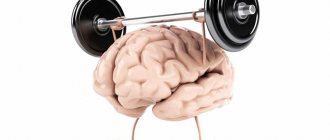Greetings, friends!
Each of us has at least once encountered a state in which we don’t want anything. This usually occurs due to overexertion or tiring work and goes away after a good rest. But sometimes such a condition can drag on, seriously and permanently worsening the quality of life and not allowing a person to enjoy basic joys. This phenomenon is called anhedonia. Today we will take a closer look at what anhedonia is, why it occurs and how to deal with it. Let's begin.
What is anhedonia?
Anhedonia (removal of the letter “I”) is a decrease or complete loss of the ability to experience pleasure. A person immersed in this state can no longer enjoy things that previously gave him pleasure. He even loses the desire for pleasure, so he behaves passively and does not try to correct the situation. He loses interest in sports, music, delicious food, hobbies, communication, and in severe cases, even sex.
The word "anhedonia" is of Greek origin. It is formed from the words ἀν- (“an-” is a prefix meaning negation) and ἡδονή (“hedone” - pleasure, enjoyment). At the end of the 19th century, the French psychologist Théodule Ribot proposed using this term to denote the characteristic apathy that develops in liver diseases. Subsequently, this term became entrenched in psychology, but received a broader meaning.
In ICD-10, anhedonia is present as a symptom of a number of personality disorders. In particular, it is indicated as a key symptom of a depressive episode. According to DSM-5 (the nomenclature of mental disorders used in the United States), anhedonia is the main diagnostic criterion for depression.
Do I need treatment?
When we talk about treatment, we mean the disease as an element of depression or an independent disorder. If we are talking about anhedonia as a symptom of mental personality disorders, treatment by a psychiatrist is clearly necessary.
Anhedonia can have both psychological and physical roots (see the section on the causes of the disease). Physiological, in most cases, require drug therapy, including hormonal therapy. Psychological problems can be treated with the help of a specialist and under his guidance at home. In any case, a clear diagnosis and consultation with professionals is necessary.
Signs of anhedonia
Anhedonia is a serious condition that can cause serious harm to a person's mental and physical health, as well as have a negative impact on his personal and social life. It is quite difficult to identify it, since each of us has a bad mood at least occasionally. And if someone is moping for a long time and doesn’t want anything, he himself and his loved ones usually attribute this to life circumstances. In such cases, it is important to identify the pathology in time and seek help from a psychotherapist as soon as possible.
Clear signs of anhedonia include the following:
1. Indifference to everything
. A person reacts almost indifferently to everything that was previously important to him. And this “philosophical” indifference extends to both positive and negative events that happen to him. He reacts equally calmly to praise and criticism, does not strive to celebrate his own birthday and is not particularly happy about the birthday of a loved one. At the same time, he can portray emotions so as not to arouse suspicion.
2. Reluctance to communicate
. Communication brings joy to most people. If a person loses the desire to spend time communicating with friends and family, this process becomes boring and extremely tiring for him. Therefore, a person who has fallen into a state of anhedonia usually avoids communication, preferring to be in solitude.
3. Lack of hobbies and interests
. A person is designed in such a way that he strives to find interesting and exciting activities that are not directly related to work and personal life. The state of anhedonia is characterized by the fact that a person loses interest in everything, including things that he was previously ready to do at any time. At the same time, he explains the loss of interest in his favorite activity by the fact that he “just didn’t like it anymore.”
4. Loss of interest in art
. Every person likes something: painting, music, poetry, literature and other genres of art. But a person who has succumbed to anhedonia loses interest in all of the above. Even his favorite genre of music no longer evokes pleasant emotions in him.
5. Closedness
. This is already an indicator of extreme pathology. A person literally experiences discomfort from human society. Even the people he used to enjoy spending time with no longer make him happy. Therefore, he prefers to live in complete solitude. And if someone he knows tries to visit him or even call him, it will only irritate him.
A characteristic sign of anhedonia is loss of interest in elementary pleasures. A person no longer strives to enjoy tasty food and, to suppress hunger, can eat any food, paying little attention to its taste. Even sex ceases to be a pleasure for him and turns into an ordinary need.
If this condition is allowed to consume a person, the consequences can be extremely sad. This has an irreversible effect on the psyche , worsens physical condition, leads to the destruction of social ties and deterioration of the financial situation.
It is no exaggeration to say that due to prolonged anhedonia, a person can lose literally everything.
Symptoms
Anhedonia develops gradually, imperceptibly. For a long time it may not manifest itself in any way. Initially, there is a fading of interest in previously exciting and entertaining areas of life, for example, in sports for men or handicrafts for women.
Later, the symptoms of anhedonia spread more widely - the inability to experience pleasure is felt literally in everything. Family holidays, meetings with friends, corporate meetings - nothing can lift your spirits and seems pointless.
Severe depression draws a person more and more into its “pool”:
- pronounced psychological discomfort outside the familiar environment becomes more and more pronounced - even leaving the apartment for bread or milk begins to frighten;
- the need to attend work loses its significance - people try to arrange everything in such a way as to work without leaving their home, to reduce all contacts to a minimum, social anhedonia is formed;
- a persistent dislike for social events develops - concerts, parties;
- understanding of jokes and the reasons for laughter among others is lost;
- satisfaction from the actions performed gradually fades away - simple and accessible to others, everyday joys no longer decorate everyday life, all days become equally gray;
- such an important component of adult life as intimate life also loses its significance - orgasmic anhedonia.
All of the above can result in symptoms of a nervous breakdown - a serious disorder requiring specialized medical care. However, experts even consider such an outcome as a good thing - the human psyche is, as it were, cleared, and a revision of values occurs. Correctly selected treatment - pharmacotherapy and psychocorrection have the desired effect, the person returns to society.
Types of anhedonia
Anhedonia is not always all-consuming. Sometimes it completely changes one area of a person's life, but has much less impact on others. Depending on the affected area, the following forms of anhedonia are distinguished:
1. Social
. This is a loss of interest in the social component of life. A person begins to treat communication with friends with indifference and becomes withdrawn. If someone close to him tries to “stir up” him, he can completely end the relationship with him, just to be left alone. Social anhedonia is a fairly common phenomenon. This is a relatively mild form of the disorder, allowing the person to remain interested in other pleasures.
2. Physical
. A person loses interest in himself. He doesn’t play sports, doesn’t take care of his health, and doesn’t care what he looks like. In such a state, a person does not strive to fight bad habits, since he has a greatly distorted idea of life values.
3. Aesthetic-intellectual
. The main symptom of this form of anhedonia is a lack of interest in education, self-development and self-actualization. Also, a person ceases to be interested in art, new technologies, music, films and other things that previously gave him aesthetic pleasure.
4. Sexy
. With sexual anhedonia, interest in enjoying sex is significantly reduced. The need to realize the sexual instinct remains, but sex is perceived as a “marital duty”, and not as intimacy with a loved one or at least a desired person.
In modern psychology, anhedonia is considered a severe mental condition that may indicate serious pathologies such as depression, schizophrenia, anxiety disorder, narcissism, PTSD (post-traumatic stress disorder) and other disorders.
Instead of conclusions
Psychiatric tests easily determine the disease. Also, with their help, an experienced doctor can understand what we are talking about: an independent disease or a symptom of a serious mental disorder. But in no case should you confuse medical tests with psychological tests that are replete with the Internet. The former are created for diagnosis, and the latter for the entertainment of readers.
Anhedonia is a disease that robs a person of joy. The ability to enjoy activities is the main source of inspiration; in its absence, a person loses the desire to do something, falls into apathy and depression. Therefore, if you notice symptoms of the disease in yourself or your loved ones, you should urgently consult a doctor before time is lost, and with it the chances of a successful cure.
Causes of anhedonia
Studying what anhedonia is and why it occurs, researchers have come to the conclusion that the reasons for its occurrence can be both physiological and psychological in nature. In the first case, the disorder may develop due to dysfunction of the pleasure center - a part of the brain that is responsible for joy, pleasure and other positive emotions. Dysfunction of the pleasure center can occur for various reasons: due to injuries, somatic diseases or intoxication.
The list of the most common psychological causes of anhedonia includes factors such as:
1. Soviet thinking model
. In Soviet times, no one tried to look too successful so as not to arouse envious glances. People are accustomed to the need to suffer and endure all kinds of hardships, and they raised their own children in this spirit. Therefore, echoes of “Soviet thinking” are present even among very young representatives of the millennial generation (who are millennials?).
2. Feeling of injustice
. Many people have a desire to be dependent on the state, which should provide them with everything: work, housing, a car. And if someone lives better, this is probably a consequence of “global injustice”, from the awareness of which a person gives up and loses all desires.
3. Victim complex
. It is often present in people who faced family tyranny in childhood. If there were traditions of serious punishment in the family, the child was regularly subjected to physical and emotional violence, a clear relationship is formed: “if you do something of your own free will, you will be severely punished.” Having matured, he is simply afraid to allow himself to receive real aesthetic or physical pleasure.
4. Negative Affirmations
. Surely you know about such a psychological technique as positive affirmations (what are affirmations?). By analogy with them, negative affirmations are also possible, which many of us have had since childhood. They are usually associated with superstitions, religious views or the life position of the parents. For example, overly religious parents could convince you that our world is a “vale of suffering”, so you need to suffer and be in poverty. There are also popular beliefs that a rich person will never be able to get into Heaven, and in general, if a person is rich, it means he is a thief and a bandit. Unfortunately, many parents impose such beliefs on their children, ruining their lives.
5. Parental cruelty
. Some parents consider punishment for every small offense to be a normal method of education. They are confident that this approach will allow them to raise a responsible and disciplined child. Having matured, a person brought up in this way forbids himself to have pleasure, since he has been accustomed to do so since childhood.
6. Emotionally unstable parents
. Sometimes parents simply take their anger out on their child. And if he has done nothing wrong, at such moments he is reminded of old and long-forgotten mistakes. As a result, he lives in constant fear that he can be punished at any moment, regardless of his own behavior. And this leaves a serious imprint on the psyche.
7. Dependency on partner
. In some cases, addiction is used to keep the person around. Constantly being in a state of “victim”, a dependent person loses the opportunity to calmly enjoy the joys of life.
If you look closely at the reasons listed, you can understand much better what anhedonia is. You have probably noticed that in all cases, in one way or another, there is a fear of punishment for pleasure. The mechanisms of its formation may be different, but the result is the same - a person is simply afraid to experience joy and pleasure, and therefore even the slightest hint of these feelings causes him severe discomfort.
Diagnostics
Specific diagnostic methods for this disorder have not yet been developed. Laboratory and instrumental diagnostics also make no sense, since they have no diagnostic value in this case.
The fundamental diagnostic measure is to study the clinical picture, talk with the patient, collect a personal history, and study the patient’s medical history. Based on the results of the clinical interview, the final diagnosis is made.
However, we should not forget that if this disease is a consequence of another psychiatric disorder, then additional diagnostic measures may be required, the nature of which will depend on the current clinical picture.
How to cope with anhedonia?
If you are faced with this condition, the first step to combat it is to reconsider your attitude towards life's difficulties. Yes, they happen to everyone, but they should not be taken for granted, but as temporary inconveniences. The norm is the presence of difficulties, but not that these difficulties ruin your life. Therefore, they must be overcome quickly, minimizing potential damage.
Surely your life is full of achievements that you are used to not paying attention to, concentrating on failures. It is necessary to reevaluate priorities and stop focusing on the negative, and specifically focus on good events.
To get rid of anhedonia on your own, you need to follow these steps:
1. Work on your complexes and increase your self-confidence.
2. Understand your desires, interests, needs and goals, compare them with opportunities.
3. Learn to cope with failures by learning from them.
4. Identify negative parenting beliefs and get rid of them.
5. Get rid of prejudice and fear that someone will be jealous of your success.
6. Learn to rejoice, enjoy, have fun without fear that you will have to pay for everything.
Remind yourself regularly that you have the right to be happy and enjoy all the pleasures available to you. Don't worry that someone will be jealous. Not everyone is able to be happy for others, and this should not bother you. And yet, try to make sure that there are only positive people around who sincerely rejoice at your successes. It is also advisable to get rid of superstitions instilled by the older generation, so as not to be afraid of the evil eye, “heavenly punishment” and other options for paying for a happy life.
It is also very useful to further strengthen the nervous system. Remember that this is a very sensitive and fragile mechanism that requires careful and caring treatment. In order for the nervous system to be in order, the following rules must be followed:
1. Sleep at least 7 hours daily.
2. Eat a balanced diet, avoid junk food and alcohol.
3. Spend at least 20 minutes playing sports every day.
4. Walk in the fresh air for at least half an hour every day.
5. Get rid of irritating factors (boring work or relationships that have ceased to bring joy).
6. Read more - it helps to escape from reality and briefly switch to a completely different context (how to force yourself to read?).
In some cases, anhedonia results from mental or physical exhaustion. a vacation and a good rest with a change of scenery may well help But more serious changes may be required, for example, changing jobs or moving to another city.
If anhedonia is a condition that has haunted you most of your life, most likely you won’t be able to get rid of it on your own. In this case, it is advisable to contact a psychotherapist who can determine the cause in order to work with it directly.
Drug treatment
In more severe cases and when symptoms are severe, antidepressants and sedatives are used for treatment. They help reduce the excitability of the nervous system, relieve excess tension, anxiety, fears and increase blood levels, which has a beneficial effect on the patient’s condition. But all these drugs should be used only as prescribed by a doctor, since in some cases they can only increase the manifestations of anhedonia.
Author of the article: psychiatrist Shaimerdenova Dana Serikovna











